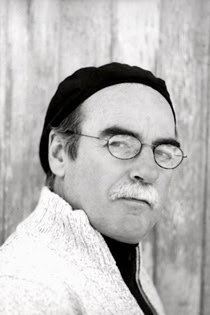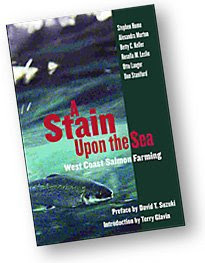
Another long delay in writing here, my apologies. Been busy with the Wild Salmon Circle, a citizen group that has begun to meet regularly since June to look for effective ways of getting salmon farms out of BC waters. With the Fraser sockeye collapse and the DFO's ironic role at the Nor-Aqua industrial aquaculture conference in August, the WSC felt it had to speak out and called a rally outside DFO headquarters in downtown Vancouver. Since then, the group has attracted some smart minds on this issue-- filmmakers, biologists, self-described 'angry old men-- and the WSC may be in a position to help provoke a citizen groundswell on the salmon farming issue. Far too much to say about all of it, but here is the WSC's current project, a citizen rally in downtown Vancouver on October 3:
WHERE: The Vancouver Art Gallery, on Georgia between Hornby and Howe
WHEN: October 3, 2009, 1:00 p.m.
WHAT: A rally for wild salmon at the Art Gallery. Guest speakers, Tum Tum the wild salmon in costume, information, petitions, and with luck some wild salmon cultural activities.
PURPOSE: To demand the DFO immediately remove salmon farms from the BC coast, and begin restoring our stocks of wild salmon-- and to begin a non-partisan, democratic citizen movement for the preservation of wild salmon.
´¯`·.¸¸.·´¯`·.¸><(((((º>
The Wild Salmon Circle* is calling all concerned citizens in British Columbia to a rally in Vancouver on October 3, 2009 to stand up for our wild salmon.
If we do not demand change, we may see the demise of these amazing fish--upon whom orcas, grizzlies, forests and humans depend-- in our lifetime. While we recognize there are many factors affecting wild salmon, salmon farms have been proven undeniably by Canadian and international research to result in disastrous collapses for wild salmon, everywhere they have been placed. We must address this issue first.
We don't need to trade thriving biodiversity for economic growth. There are better ways to create jobs from our wild waters.
We demand an end to DFO denial, broken promises by government and industry, and to the endless delays that keep these farms operating in BC's coastal waters.
Dozens of conservation groups and scientists in B.C. have fought for years to remove open-net salmon farms from BC, and to preserve wild salmon stocks in many other ways. We can't leave this fight up to them any more, or put our faith any longer in government agencies who care more about politics than wild salmon. These are our fish.
´¯`·.¸¸.·´¯`·.¸><(((((º>
We need to rally together and speak to the federal government with one voice: Open-net salmon farms out of BC waters, now.
Please join us! Show up on October 3, 2009 to show your support for wild salmon. Let government and industry know we won't stand for further delays in removing open-net salmon farms from our waters. Our salmon have waited long enough.
Go here for Event Updates: <http://www.facebook.com/group.php?gid=125938871793>
A pre-rally event will be held September 16 at noon in front of the DFO offices at Burrard and Pender. If you can join us on this day as well, that would be great. The purpose of this event is to inform the people and the government of the issue and recruit as many people as possible to the October 3 rally.
´¯`·.¸¸.·´¯`·.¸><(((((º>
BACKGROUND FACTS:
• Open-net salmon farms have wiped out populations of wild salmon and sea-run trout in Norway, Ireland, and Scotland.
• In BC's Broughton Archipelago, salmon farms have caused catastrophic collapses of pink salmon stocks. There is good reason to believe, based on research by Alexandra Morton and others, that they have also played a role in the decline of Fraser sockeye.
• Ninety percent of BC's 130 farms are owned by Norwegian multinational corporations, who reap profits while polluting our waters and killing wild salmon.
• Over 80% of BC farmed salmon is sold and eaten in the United States.
• In August 2009, the Canadian government hosted a pavilion at the Nor Aqua aquaculture trade show in Norway. DFO Minister Gail Shea and other DFO staff put out the red carpet there to more multinational salmon farm corporations, offering up still more of our waters to this toxic industry.
* The Wild Salmon Circle is a group of citizens concerned about the possible extinction of wild salmon stocks in BC. We do not represent any particular NGO, agency, special interest or lobby group. We are BC citizens who want wild salmon to thrive for our children and all future generations.


















